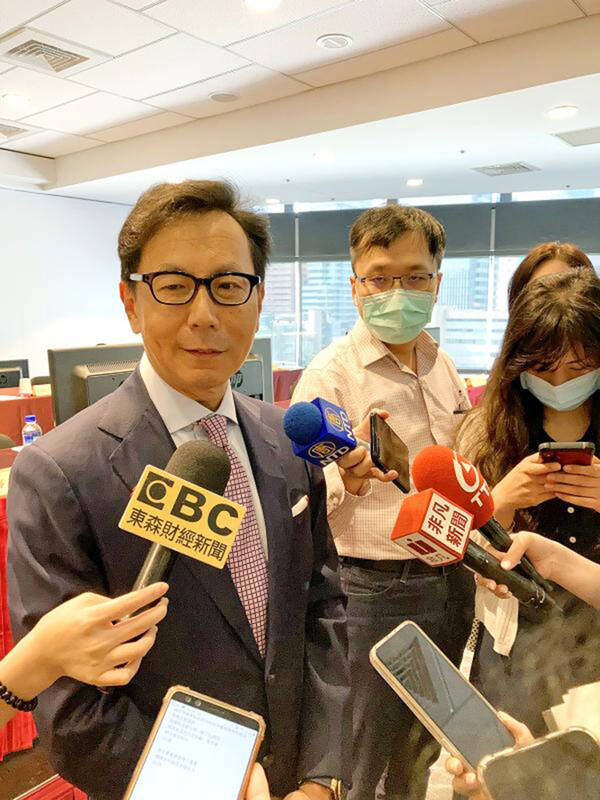Brothers Daniel Tsai (蔡明忠) and Richard Tsai (蔡明興), who run Fubon Group (富邦集團), took the top spot in Forbes magazine’s list of Taiwan’s 50 richest people this year, despite an 8 percent fall in their net worth.
The two brothers were among 22 of the top 50 billionaires in Taiwan who saw their net worth shrink, but they still rose two spots from last year to reclaim the No. 1 position after a five-year gap, the magazine said.
The wealth of the Tsai brothers shrank to US$8.8 billion as Fubon Financial Holding Co (富邦金控) took a hit from COVID-19 insurance claims, which pushed down the company’s earnings and share price last year, Forbes said.

Photo: Lisa Wang, Taipei Times
In addition to their financial empire, the Tsai family owns telecom Taiwan Mobile Co (台灣大哥大) and e-commerce platform momo.com Inc (富邦媒體).
After the Tsai brothers, the four Wei brothers — Wei Ing-chou (魏應州), Wei Ying-chiao (魏應交), Wei Ying-chun (魏應充) and Wei Ying-heng (魏應行) — who control food and beverage conglomerate Ting Hsin International Group (頂新集團), took second place with a net worth of US$8.3 billion, Forbes said.
Ting Hsin owns Master Kong, one of the largest instant noodle suppliers in China which reported record-high sales of US$11.4 billion last year, the magazine said.
Taking the No. 3 spot was Lin Shu-hong (林書鴻), cofounder of the petrochemical conglomerate Chang Chun Group (長春集團), who benefited from rising chemical prices and saw his wealth grow to US$7.9 billion.
Also affected by hefty COVID-19 insurance claims, the brothers Tsai Hong-tu (蔡宏圖) and Tsai Cheng-ta (蔡政達) of Cathay Financial Holding Co (國泰金控) fell to No. 4 this year from No. 2 a year earlier with a net worth of US$7.7 billion, Forbes said.
Falling from the top spot last year, low-key and self-made footwear tycoon Zhang Congyuan (張聰淵) took fifth spot in the latest list as his wealth contracted in US dollar terms by US$4.5 billion to US$7.6 billion.
Zhang’s wealth shrank as shares of his Guangdong-based Huali Industrial Group (華利實業集團), which is listed on the Shenzhen Stock Exchange, dropped due to decreased orders amid COVID-19 pandemic-induced disruptions.
Terry Gou (郭台銘), founder of the world’s largest contract electronics maker, Hon Hai Precision Industry Co (鴻海精密), came in sixth after his wealth rose to US$7.4 billion this year from US$6.8 billion.
Gou’s wealth largely comes from iPhone assembler Hon Hai, also known as Foxconn (富士康) globally, whose sales rose 11 percent from a year earlier to US$217 billion last year.
The Chang brothers — Jason Chang (張虔生) and Richard Chang (張洪本), who are chairman and vice chairman of chip packaging and testing services provider ASE Technology Holding Co (日月光投控) respectively, took seventh place with a net worth of US$6.3 billion, ahead of chairman of snack and beverage brand Want Want Group’s (旺旺集團) Tsai Eng-meng (蔡衍明), with US$6.1 billion in net worth.
Tsai was followed by Barry Lam (林百里), chairman of contract notebook computer maker Quanta Computer Inc (廣達電腦), with US$5.6 billion, and chairman of electronics component maker Yageo Corp (國巨) Pierre Chen (陳泰銘), with US$5.5 billion.

UNCERTAINTY: Innolux activated a stringent supply chain management mechanism, as it did during the COVID-19 pandemic, to ensure optimal inventory levels for customers Flat-panel display makers AUO Corp (友達) and Innolux Corp (群創) yesterday said that about 12 to 20 percent of their display business is at risk of potential US tariffs and that they would relocate production or shipment destinations to mitigate the levies’ effects. US tariffs would have a direct impact of US$200 million on AUO’s revenue, company chairman Paul Peng (彭雙浪) told reporters on the sidelines of the Touch Taiwan trade show in Taipei yesterday. That would make up about 12 percent of the company’s overall revenue. To cope with the tariff uncertainty, AUO plans to allocate its production to manufacturing facilities in

Taiwan will prioritize the development of silicon photonics by taking advantage of its strength in the semiconductor industry to build another shield to protect the local economy, National Development Council (NDC) Minister Paul Liu (劉鏡清) said yesterday. Speaking at a meeting of the legislature’s Economics Committee, Liu said Taiwan already has the artificial intelligence (AI) industry as a shield, after the semiconductor industry, to safeguard the country, and is looking at new unique fields to build more economic shields. While Taiwan will further strengthen its existing shields, over the longer term, the country is determined to focus on such potential segments as

TAKING STOCK: A Taiwanese cookware firm in Vietnam urged customers to assess inventory or place orders early so shipments can reach the US while tariffs are paused Taiwanese businesses in Vietnam are exploring alternatives after the White House imposed a 46 percent import duty on Vietnamese goods, following US President Donald Trump’s announcement of “reciprocal” tariffs on the US’ trading partners. Lo Shih-liang (羅世良), chairman of Brico Industry Co (裕茂工業), a Taiwanese company that manufactures cast iron cookware and stove components in Vietnam, said that more than 40 percent of his business was tied to the US market, describing the constant US policy shifts as an emotional roller coaster. “I work during the day and stay up all night watching the news. I’ve been following US news until 3am

COLLABORATION: Given Taiwan’s key position in global supply chains, the US firm is discussing strategies with local partners and clients to deal with global uncertainties Advanced Micro Devices Inc (AMD) yesterday said it is meeting with local ecosystem partners, including Taiwan Semiconductor Manufacturing Co (TSMC, 台積電), to discuss strategies, including long-term manufacturing, to navigate uncertainties such as US tariffs, as Taiwan occupies an important position in global supply chains. AMD chief executive officer Lisa Su (蘇姿丰) told reporters that Taiwan is an important part of the chip designer’s ecosystem and she is discussing with partners and customers in Taiwan to forge strong collaborations on different areas during this critical period. AMD has just become the first artificial-intelligence (AI) server chip customer of TSMC to utilize its advanced